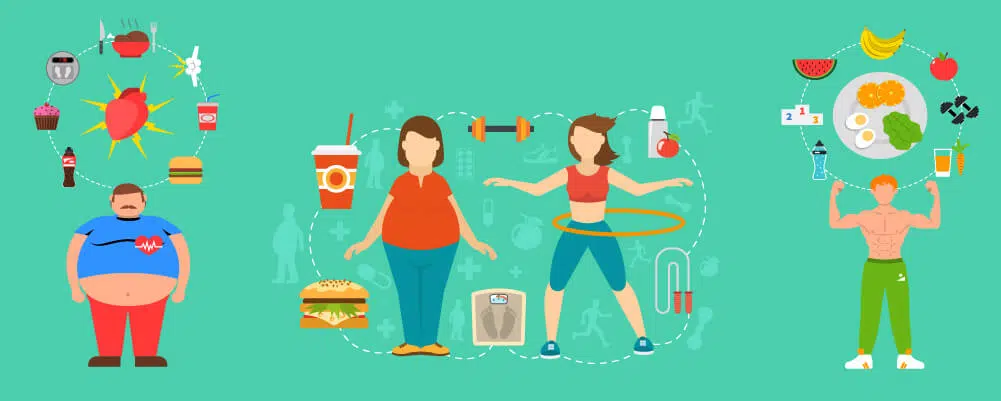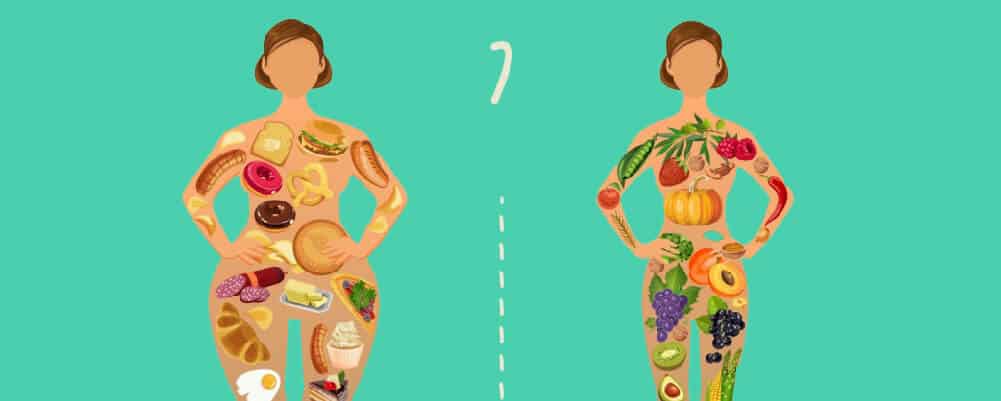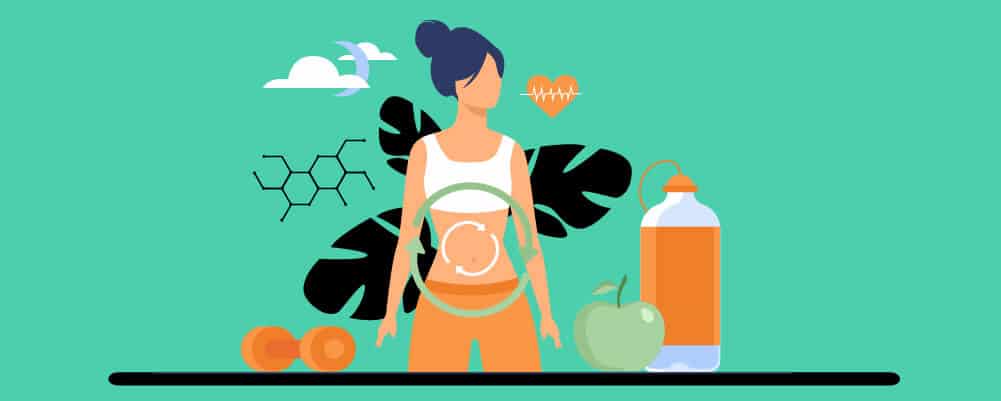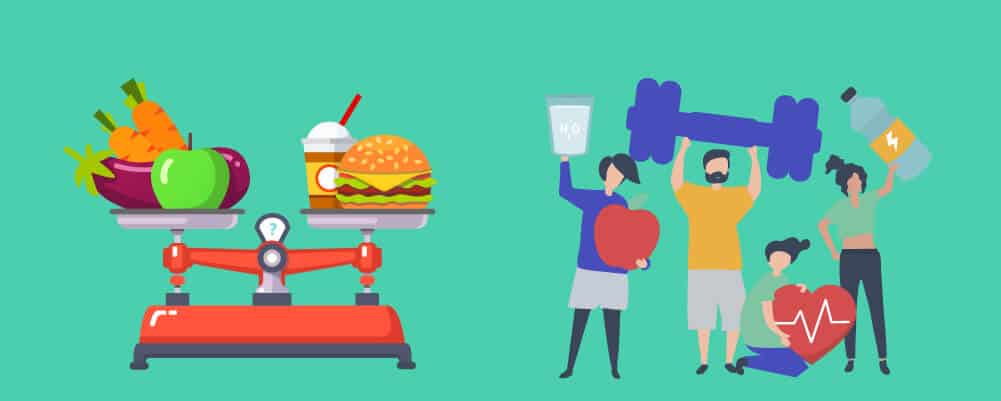Introduction
When trying to become healthier, it helps to know all about your metabolism. Your metabolism is a set of chemical reactions that regulates your weight gain and loss, so understanding how it works is a great advantage when trying to get fit.

Here you’ll learn everything you need to know about metabolism, how to increase it, and the benefits of doing so. We have lots of information about the habits and diets that will help speed up your metabolism and make you a healthier, happier human being.
Where possible, we have included references to supporting materials. This is to verify any scientific and dietary information we have provided, and it’s also extra reading that some readers will appreciate.
That said, this guide will have everything the average person needs to know. Let’s start with what metabolism is and how it impacts your life every single day.
What Is Metabolism?

It helps to know what metabolism is before we start. As briefly mentioned in our introduction, metabolism is a chemical reaction that takes place in our bodies, specifically within the cells of our body.
Your Metabolism
Let’s start with a simple explanation of metabolism and its place in your body. No matter your body size or type, the metabolic process is the same across human beings.
This is because it’s one of the basic functions that our bodies perform, as important and natural as breathing. There are thousands of metabolic reactions happening in your body all at once, which are regulated by specific proteins working hard within the body.
Through metabolic reactions, the food that has been broken down by our digestive systems is transformed into usable energy, which is then used by the muscular tissues in our body. The energy isn’t just used for active movement, it’s even used for thinking and other stationary activities where you’re not exerting yourself.
How It Works
The best way to explain how our metabolisms work is by detailing the process. It all starts when we eat food, which makes its way to our digestive system.
There, enzymes work to break the food groups into simple acids and sugars, as you may have learned in science class. Fats become fatty acids, proteins become amino acids, and carbohydrates become sugars, mainly glucose.
Those substances are then available to become energy sources when the body needs them. They get transported to the cells through absorption into the bloodstream, where it is carried to the areas that need the energy for storage or use. This is most often in the liver, muscular tissue, and body fat.
Metabolism can be broken down into two different processes, though they are both required and they both go on at the same time.
The first is anabolism, which is the building up of energy stories in our bodies. Then there is catabolism, which is where those stores are broken down to facilitate bodily functions.
Without both of these working in tandem, the body would suffer from having too much or too little of these energy-giving compounds within our muscles and organs.
Understanding Your Metabolism
If you want to become healthier, you don’t need to get lost in the minutiae of which cells are burning which compounds. Instead, you can do a lot by learning which factors affect your metabolism and your body, by extension.
First, you need to understand that three main factors affect metabolism:
1. Basal Metabolic Rate
This is your standard metabolic rate, at rest. It’s the minimum number of calories you burn when you’re not exerting yourself. It is often abbreviated to BMR and it’s affected by a variety of factors, many of them unchangeable.
Age, for example, is one of them. Most people’s basal metabolic rate peaks in their early 20s, then it’s downhill from there. Your sex and height can also affect your metabolic rate. Something called the Harris-Benedict formula is used to estimate our BMR:
Men = 66 + (13.7 x kg weight) + (5 x cm height) – (6.8 x current age)
Women = 655 + (9.6 x kg weight) + (1.8 x cm height) – (4.7 x current age)
2. Digestive & Endocrine Systems
The metabolic process starts in the digestive system, so it makes sense that it plays a part in metabolism. Having faster or slower digestion doesn’t necessarily speed up the metabolic processes that happen afterward. Instead, our digestive system and our metabolism work in tandem with one another.
As for the endocrine system, the thyroid is known to play a part in regulating weight gain. That’s because it has a say in the speed of your metabolic rate.
Conditions like hyperthyroidism and hypothyroidism are where thyroxine is delivered in too much or too little quantities, affecting the metabolism.
The pancreas also creates hormones that control metabolic activity, namely whether the activity is anabolic or catabolic. By detecting a higher glucose content in the body, the pancreas releases insulin to increase anabolic activities.
3. Physical Activity
Lastly, the state of your body and physical activity habits will make some changes to your metabolism. While the BMR is a resting measurement of your metabolism, you can kick the metabolism into high gear during workouts, allowing you to burn more calories.
These are things that you probably understand already – that working out helps to burn calories – but you may not have heard it in a metabolic context before. The surest way to lose weight is to regulate your diet while also working out, so your metabolism can regulate your bodily health.
Having more muscle tissue than body fat tends to improve a person’s metabolic rate, though there are always exceptions and the effectiveness of building muscle is debated.
Top Tips For Increasing Your Metabolism

Now that we know more about metabolism and how it works, it’s time to look at what you can do to speed it up. Here are eight tips that you should practice in your everyday life.
It takes approximately 30-60 days to build positive habits and, by incorporating these into your life, you can regulate your metabolism without even trying!
Eat A Variety Of Protein
The foods we eat can have a temporary effect on our metabolism. This is often referred to as the thermic effect of food, or TEF, and it’s caused by nutritional foods that require extra calories to digest.
The best food group to eat to take advantage of TEF is proteins. Eating a variety of proteins can increase your metabolic rate by up to 30%. Comparatively, carbohydrates typically yield a 10% TEF while fats orbit 3%.
Eating lean meat and other protein-bearing foods are handy for those on a diet too, as they are often the same foods that suppress appetite and prevent overeating. It can also help you keep muscle mass while losing weight.
Drink Water
You should be drinking water every day already but, the truth is, many people don’t drink enough. If you’re one of those people, drinking water every day will help keep your metabolism regulated, making you a healthier person. For most, eight cups of water a day is necessary.
Many people substitute water with sugary drinks that have more calories, making it harder to lose weight. It can also nurse sugar cravings, where gut microbes demand more sugary foods, knocking you off your health kick completely. We have more on gut health later in this guide.
Drinking water can also give a temporary metabolism speed boost, just like protein. Drinking cold water is even better because your body also uses energy to heat the water. It also fills you up, again stopping you from overeating if weight loss is your goal.
Work Out More
As we mentioned above, working out helps speed up your metabolism and become healthier as a result.
The best kind of workout is high-intensity interval training or HIIT, which is where you exercise in quick, intense activities. They get your body moving, allowing you to burn more fat in less time, which increases your metabolic rate. It leaves an afterglow that makes your metabolic rate faster for a short time afterward, too.
Weight Train
Along with HIIT workouts, you should also start weight training if increasing your metabolism is the goal. Our muscles, specifically the skeletal muscles, are the most metabolically active part of our bodies. This makes building muscle as effective, if not more, than burning fat during cardio exercise.
Some studies have suggested building muscle stops slowing metabolisms when losing weight. Needless to say, building muscle is also great for your health in general. You will feel better, have more self-esteem, and will be more effective at jobs that require you to haul things around and work with your hands.
Stand Throughout The Day
You may have heard that sitting down is one of the worst things you can do for your long-term health. Sitting too much has been shown, again and again, to have a detrimental impact on the body. This mainly expresses itself through an increased likelihood of heart disease, higher blood pressure, and higher levels of bad cholesterol.
It also burns fewer calories, so you’ll gain more weight sitting. So, what’s the alternative? Try standing wherever you can. It may take some time to get used to it and your feet may ache at first but, by standing, you can burn an extra few hundred calories at work.
This is more important when you’re working a desk job or jobs that would usually require sitting down, obviously.
You can get standing desks that allow you to perform office duties and other desk-bound activities without having to sit.
Have A Good Sleep Routine
Just like with water, you’ve probably heard that getting a good night’s sleep is the key to good health. Not getting enough sleep has been linked to obesity in the past and it may be due to the effects of sleep deprivation on metabolisms. For most people, the optimal sleep period is between six and eight hours.
Not getting enough sleep can also increase blood sugar levels and the body’s resistance to insulin, which are both risk factors in the development of type 2 diabetes. Insulin, if you remember, is also used in the metabolic process, so developing diabetes can slow your rates down.
It can also mess with your ghrelin and leptin levels. Ghrelin is the hormone that makes you feel hungry while leptin is the hormone that makes you feel full. By throwing them out of balance, you can overeat or undereat, both of which will negatively impact metabolism.
Eat Small Meals Throughout The Day
Eating smaller meals throughout the day can help regulate your metabolism and keep it in perfect working order. Think of your metabolism like a treadmill that slows down when nothing is on it, so you want to keep it working throughout the day.
If you eat one big meal, then the metabolism can ramp up, do its job, and then go back to its slower basal rate. If you eat several smaller meals throughout the day, you can pace your metabolism and get more out of the chemical reactions that are happening in your body.
While this is debated, there are clear benefits to spreading your meals. It helps to quell your appetite, so you can lose weight easier, and that helps your metabolism indirectly.
Reduce Stress
Being stressed can cause weight gain and adversely affect your metabolism. As you may know, stress is regulated by cortisol, your body’s built-in alarm system. When you get stressed, you get a dump of cortisol that activates fat and carbohydrate stores in the body.
That makes sense since cortisol also comes out in situations where you may need to fight to survive.
For most of us, however, cortisol is an unwelcome influence on our bodies. Along with the stress hormone comes a craving for sugary, fatty, and salty foods that can also be used for body fuel. This can lead to overeating and disturb the metabolic balance in our bodies.
Foods You Should Try To Increase Metabolism

Along with these daily habits that you can integrate into your life, you should also look at what’s on your plate. Remember that metabolism starts in the digestive system, so the foods we eat can and do influence metabolic performance.
While some sabotage the metabolism, like sugary foods that promote weight gain and other health issues, other foods increase your metabolic rate. Here are eight examples that you should try out.
Green Tea
First, here’s a simple one that works well with any diet and lifestyle – green tea. Green tea has increased metabolism in the past, as has oolong tea. In both cases, the teas facilitate the conversion of stored body fat into fatty acids, which are then used for energy to remove the fat from your system. The fat burning can be increased by as much as 17% in some cases.
They are also low in calories, so you’re not adding more weight when you’re drinking green tea. Like with so much research, there is a debate over how much teas can affect metabolism and whether it applies to everybody or just specific people.
Spicy Foods
One of the substances that can help boost metabolism is capsaicin. If that sounds familiar, it’s because it’s probably in your kitchen right now – capsaicin gives foods their spiciness.
Peppers and chilies contain capsaicin, which has been found to boost metabolism. However, there’s a catch. Many people cannot tolerate the amount of capsaicin that will create a noticeable change in metabolism.
In one study, it was found to burn approximately ten more calories at manageable doses. It means eating red peppers as much as you can, however, and the dividends aren’t much when compared to the tips we outlined above.
Lemons
Lemons, and more specifically lemon water, are often touted as a cure for slow metabolisms and other health issues. Like capsaicin, it’s never that simple, but it doesn’t hurt to introduce lemons into your diet as long as you don’t overdo it.
Lemons, and other citrus fruits, are full of antioxidants and flavonoids that make your heart healthier. This is because lemons can influence the body’s glucose tolerance and insulin sensitivity which, if you remember, can help metabolism.
As for lemon water, what you should do is drink water, full stop. Placing lemon in the water may make it tastier but otherwise, the health benefits are negligible where your metabolism is concerned.
Ginger
Ginger is lauded as great anti-inflammatory food that you should include in your diet, especially since it can be worked into all kinds of recipes. Ginger contains substances called shogaols and zingerone that can help people lose weight, which in turn can have a positive or negative effect on the metabolism depending on other factors.
Assuming that the person is lean and won’t experience the metabolic rate plateau that happens when many lose weight, ginger can be helpful for weight loss. From there, any effect on the metabolism is indirect.
Try mixing ginger with tea to get the benefits of both!
Raw Cacao
Raw cacao is a great way to introduce healthy fats into your diet without any of the baggage that comes with other forms of chocolate. It can be tough to source healthy fat into your diet nowadays without running into fats and carbs that will make you add on weight.
While there are misconceptions about cacao, using raw cacao to get the healthy fats you need helps your immune system and metabolism.
Maca
While everybody knows what lemon and ginger are, you may not have heard of the maca root. This is an iron and iodine-heavy plant that is full of many different nutrients, such as amino acids, potassium, and calcium.
Maca is an herb that has a long history. With that history comes a whole host of unfounded claims about what it can and cannot do, and it’s not commonly used for weight loss. What we do know is that maca has changed insulin and leptin levels in rats, though more research into its effect on humans is needed.
Coffee
Coffee is one of the more notable foods that can give you a metabolism boost. It’s a lot like green tea, where it can give the metabolism a small boost without affecting your body too much in other ways.
There is more caffeine in coffee than tea, however, and so it should be consumed carefully so that it doesn’t interfere with your sleep. There is also evidence that the leaner you are, the more fat-burning benefits you get.
â¡ï¸ Best Mushroom Coffee
â¡ï¸ Does Mud Water Have Caffeine?
â¡ï¸ Does Mud Wtr Have Caffeine?
â¡ï¸ Does Mushroom Coffee Break A Fast?
High Vitamin B Foods
Vitamin B is a crucially important nutrient that everybody should have in their diet. Where all the vitamins are considered, vitamin B is the one that has the most impact on energy, brain functions, and cell metabolism.
When you’re getting enough vitamin B and all of your cells are firing on all cylinders, your basal metabolic rate will be slightly increased. It also helps with cardiovascular health, which can have negative effects on metabolism if neglected.
There are many foods full of vitamin B, here’s a list:
- Avocados
- Bananas
- Cheese
- Chicken
- Dark Green Vegetables (Spinach, Kale)
- Eggs
- Fish (Salmon, Tuna)
- Orange Juice
- Peanut Butter
- Peas
- Red Meat
- Soy Products
- Shellfish (Clams, Oysters)
- Whole-Grain Foods
How To Improve Your Gut Health

Controlling your gut health is important for regulating metabolism. If your gut is full of fatty and sugary microbes, those are the kinds of cravings that you’ll get. With that comes weight gain and, with that, your metabolism may slow down.
Here are several tips on how you can improve your gut health. If you have genuine concerns about your gut health, you should consult your doctor, especially when making changes to your diet to rectify it.
Eat A Wide Variety Of Food
Our guts are microbiomes that are full of bacteria. While some bacteria are bad, a lot of bacteria are good for your system and help maintain a healthy body. Part of that healthy body is maintaining fitness and ensuring your metabolic rate doesn’t fall through the floor.
You can get more benefits when you have diverse bacteria in your gut. To get that diverse microbiome, you need to eat a wider variety of food. Western diets are notoriously full of fat and sugar, they’re not very diverse, but this can be changed with a little effort.
Eat Fibrous Foods
When getting your diverse diet in order, you should aim to eat foods that are high in fiber. The best sources of fiber are certain fruits and vegetables, like the ones listed below:
- Apples
- Artichokes
- Bananas
- Broccoli
- Beans
- Chickpeas
- Green Peas
- Lentils
- Raspberries
- Wholegrains
Our bodies cannot digest fiber very well but the bacteria in our gut can. So, when you eat fibrous foods, think of it as feeding the bacteria inside of your gut. Then the bacteria become larger and more plentiful, making them more beneficial.
A beet supplement is a great way to add fiber to your diet and help with digestion.
Eat Fermented Foods
Another way of helping the bacteria in your gut, and introducing more, is by eating fermented foods. Fermented foods are made by breaking down sugars with yeast or other bacteria, which is usually used to create:
- Beer
- Cider
- Yogurt
- Kombucha
- Sauerkraut
Most of these contain lactobacilli bacteria, which is one of the good ones. If you get just one of those, get as much yogurt as you can. It’s by far the most beneficial and it comes in many types and flavors, so there’s something there for everybody.
Eat Prebiotic Foods
When a food promotes the growth of bacteria in the gut, it is called a prebiotic. You need to get a lot of prebiotic foods in your diet to maintain a healthy gut. Many fibers are prebiotics, as are certain indigestible carbohydrates, which cannot be digested by our systems but get broken down by gut bacteria.
â¡ï¸ Best Prebiotic and Probiotic
Eat Whole Grains
As we listed above, whole grains are a great food that should be included in a gut-healthy diet. They’re a great example of nondigestible carbohydrates that improve bacteria inside the gut and they’re found everywhere, so getting your hands on them shouldn’t be difficult.
Whole grains can promote the growth of beneficial bacteria like Bifidobacterium, Bacteroidetes, and our old friend Lactobacilli. Like with many of the foods we have covered, they also make you feel full, preventing overeating.
Certain grains, like those containing gluten, can’t be eaten by certain people.
Try A Plant-Based Diet
A plant-based diet is also a good idea if promoting gut health is your goal. They’re also ideal for those who prefer to stay away from other food groups, for lifestyle or medical reasons. One study found that a vegetarian diet limited disease-causing bacteria and helped subjects lose body weight.
By regulating the gut, body weight, inflammation, and cholesterol levels in the body, the metabolism can be improved.
Eat Food High In Polyphenols
Speaking of inflammation, polyphenols are the best weapon we have against inflammation inside our bodies. These are compounds found in plants that have been found to regulate blood pressure and have an antioxidant effect.
Here is a list of foods that contain polyphenols that are used by bacteria in the human body:
- Almonds
- Blueberries
- Broccoli
- Dark Chocolate
- Grape Skins
- Green Tea
- Onions
- Red Wine
Benefits Of Increasing Your Metabolism

Once you have implemented changes that improve your metabolism, what can you expect? There are six things we can think of, though some are more demonstrable than others.
More Energy
When you have a healthy metabolism, you will have more energy than people who have a less healthy metabolism. That energy should then be translated into physical activity to build muscle, burn fat, and keep the metabolism in check.
You’ll be more willing to exercise and get physical activity when your metabolism is healthy, too. Then, when you are engaging in physical activity, you don’t need to worry so much about counting calories since they’ll get vaporized anyway.
Improves A Maintainable Weight Loss
Many people mistake having a healthy metabolism for losing weight when they are two distinct things. A heavier person can have a healthier metabolism than a lighter person if there are different factors at play.
That said, a healthy metabolism gives you the best possible chances of losing weight when you are on a diet or exercising. With a healthy metabolism, your body will find it easier to regulate the weight of your body and the energy that your body uses.
Cleanses Your Body Of Toxins
A healthy metabolism also ensures that your vital organs are working properly. Of those vital organs, the liver is one of the main beneficiaries of the metabolic process. The liver, and organs it works with like the kidneys, are responsible for cleansing toxins from your body via urination.
An unhealthy metabolism can mess with processes like perspiration and urination, which makes your body more inefficient at removing harmful toxins.
â¡ï¸ 6 Proven Methods To Debloat Fast
Improves Your Blood Circulation
One of the organs that a healthy metabolism supports is the heart. By supporting the heart, and the cardiovascular system at large, a healthy metabolism can improve your blood circulation. This puts people at less risk of developing heart disease and the heart attacks/strokes that can come from it.
Unhealthy metabolisms also create an unhealthy cholesterol balance, where the body creates more low-density lipoprotein (the bad kind) than high-density lipoprotein (the good kind) in the bloodstream.
Elevates Your Mood
Measuring mood can be difficult but, with healthy metabolism, you can expect to experience less hunger and get healthier sleep. Both of those things can go a long way in elevating the mood of the person with a good metabolism.
There is also a relationship between leptin and dopamine, so getting your fill of the hunger-inhibiting hormone can also help you feel more satisfied on a neurological level.
Increases Your Immune System
Near the start of this guide on increasing your metabolism, we mentioned that we use energy for thinking and other stationary activities. While we don’t notice or feel it, our bodies use energy to keep our immune systems running. That’s why a healthy metabolism helps keep your immune system in working order.
Summary

That brings us to the end of our guide on metabolism and how you can increase it. By now, the connection between metabolism and a healthy body should be clear. While a healthy metabolism isn’t a guarantee, following the tips outlined above will help anybody achieve a good metabolism and a healthier lifestyle.
Related Articles
Best Over The Counter Gas And Bloating Medicines
Signs That Probiotics Are Working
Do Probiotics Cause Gas & Bloating?







